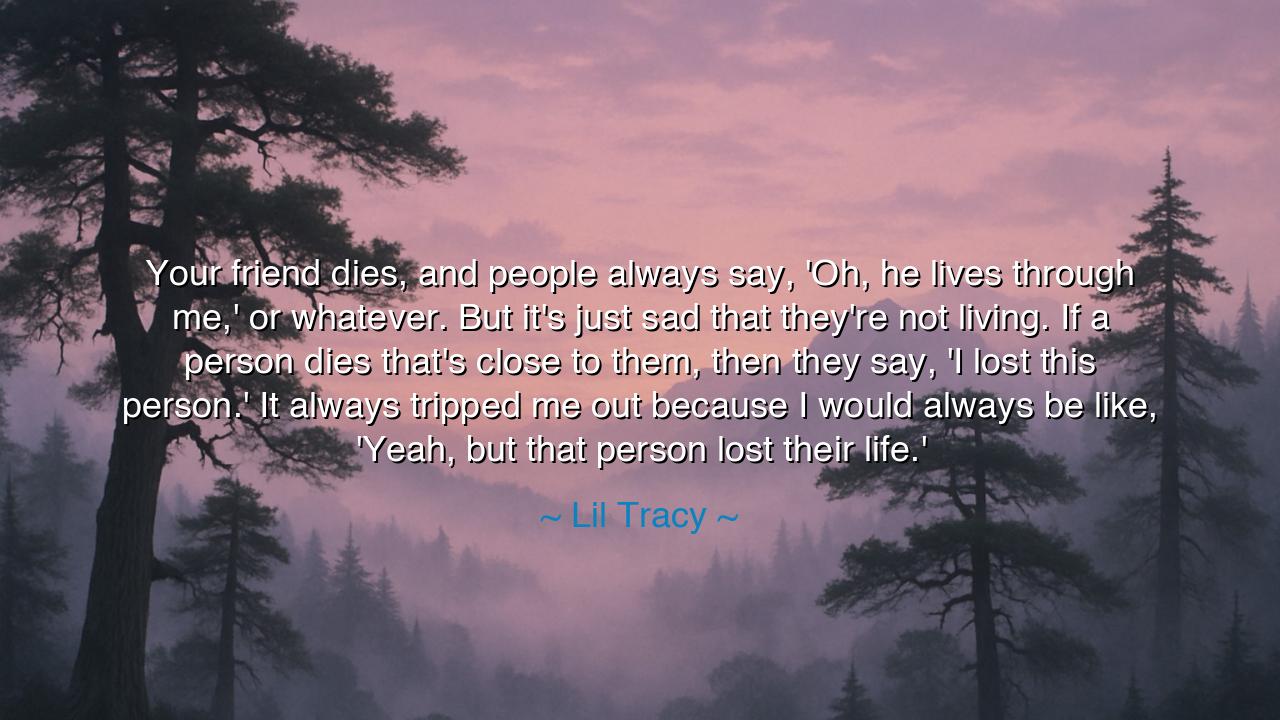
Your friend dies, and people always say, 'Oh, he lives through
Your friend dies, and people always say, 'Oh, he lives through me,' or whatever. But it's just sad that they're not living. If a person dies that's close to them, then they say, 'I lost this person.' It always tripped me out because I would always be like, 'Yeah, but that person lost their life.'






In the words of Lil Tracy, we are given a meditation on grief that pierces through the veil of custom: “Your friend dies, and people always say, ‘Oh, he lives through me,’ or whatever. But it’s just sad that they’re not living. If a person dies that’s close to them, then they say, ‘I lost this person.’ It always tripped me out because I would always be like, ‘Yeah, but that person lost their life.’” These words remind us that while mourners speak of their own sorrow, the deeper tragedy belongs to the one whose life has ended. It is a sobering call to see beyond ourselves, to grasp the full weight of death not only as a wound to the living, but as the silencing of a soul’s journey.
The ancients understood death as both loss and finality. Families tore their garments, cities raised laments, and yet in their rituals they sought to give honor to the one who had gone. To them, grief was not merely about what the living endured, but about acknowledging the greatness of the life that had ceased. Lil Tracy’s words cut to the heart of this balance: it is easy to speak of how “we” feel in loss, but harder to pause and honor the gravity of the departed, who now walks no further path in this world.
Consider the story of Achilles and Patroclus in the Iliad. When Patroclus fell, Achilles’ grief shook the heavens. He raged, he wept, he vowed vengeance. But in all his sorrow, he also recognized the deeper tragedy—that Patroclus’ life was ended, his laughter silenced, his destiny complete. Achilles’ lament was not only for his own loneliness, but for the extinguishing of a flame. And so he honored him with funeral games and sacrifices, seeking to remind all that the greatest pain was not his own loss, but the stillness of his friend’s life.
We can see the same in history with Abraham Lincoln’s assassination. The nation spoke of its loss—“We lost our leader, we lost our guide”—yet the deeper truth was that Lincoln himself had lost his chance to continue his vision, to taste the peace for which he had fought. The sorrow of the people was vast, but so too was the tragedy that his story, in flesh and breath, was cut short. Lil Tracy’s words echo this perspective, reminding us not to cloud death with self-centered grief, but to acknowledge the dignity and silence of the life now gone.
The lesson is clear: death is not only about us. Our grief is real, but it should not eclipse the reverence owed to the departed. Too often we speak of “my loss” and forget that the one who has died has endured the greater loss—the loss of all tomorrows. By remembering this, our grief grows deeper, more compassionate, more honest. We begin to see mourning not only as an expression of our pain, but as an act of honoring the fullness of the other’s life.
Therefore, when death comes near, let us shift our gaze. Let us remember the departed not only as reflections of our own hurt, but as souls who have finished their race. Speak not only of “what they were to me,” but of “what they were, and what they carried in this world.” Tell their stories. Honor their struggles. Acknowledge their silence with reverence rather than filling it only with your own cries.
Practically, this means living with awareness. Celebrate those you love while they yet breathe, so that when their life ends, your grief may be mingled with gratitude. When others die, speak less of what you have lost, and more of who they were. Let your mourning become a mirror that honors them, not only a cry that centers yourself. For in doing so, you will not only deepen your compassion, but you will give the departed the dignity they deserve.
Thus, Lil Tracy’s words stand as a reminder across time: do not let the pain of loss blind you to the truth that the greater sorrow is the silence of the one who is gone. Grieve, yes—but grieve with eyes that look outward as well as inward. For in remembering the life that has ended, you honor both them and the sacredness of life itself.






AAdministratorAdministrator
Welcome, honored guests. Please leave a comment, we will respond soon